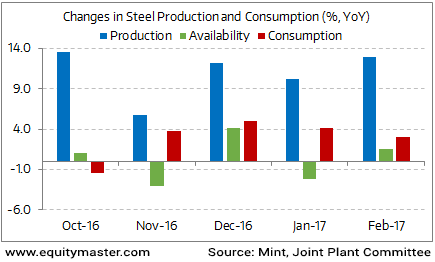Sensex Extends Fall; Metal Stocks Drag
After opening the day marginally lower, share markets in India have continued the downtrend and are trading well below the dotted line. Sectoral indices are trading on a negative note with stocks in the metal sector and oil and gas sector leading the losses.
The BSE Sensex is trading down by 226 points (down 0.8%), and the NSE Nifty is trading down by 69 points (down 0.8%). Meanwhile, the BSE Mid Cap index is trading down by 0.3%, while the BSE Small Cap index is trading down by 0.1%. The rupee is trading at 65.08 to the US$.
In news from the steel sector. India may impose anti-circumvention duty on certain stainless steel products originating from seven destinations to insulate domestic steel manufacturers.
The government has resumed investigations into circumvention of anti-dumping duties after a stay order was vacated recently by court. The products originate from China, Korea, EU, South Africa, Taiwan, Thailand and the US.
The probe was initiated in February last year by the Directorate General of Anti-Dumping and Allied Duties (DGAD), under the Commerce Ministry, but it was stayed on April 27, 2016, by the Delhi High Court. The stay was vacated on March 8, 2017.
The government has subsequently resumed investigations into circumvention of anti-dumping duties on cold-rolled flat products of stainless steel widths from 600 mm to 1,250 mm after the stay order was vacated.
Earlier in a notification, the DGAD had stated that it has sufficient evidence of circumvention of anti-dumping duties leviable on cold-rolled flat products of stainless steel originating from these seven destinations. The probe would determine the existence, degree and effect of the alleged circumvention and would also examine the need to extend the existing anti-dumping duty to the circumventing products.
In December 2015, India had imposed anti-dumping duty of up to 57.4% on import of the products from China, Korea, the US and EU for five years to save the domestic industry from cheap shipments.
No Takers for Domestic Steel

The government's proposal should protect domestic steel companies from cheaper imports. But in the meanwhile, the steel makers are chasing imports out by ramping up production.
In February, domestic steel output rose by 12.9% YoY, as large private steel producers such as Tata Steel and JSW Steel ramped up output. Imports during the first eleven months of FY17 dropped by 39% YoY.
But the bigger concern is weak consumption growth. The consumption data over the past few months clearly show that there are no takers for domestic steel. So, steel makers have been forced to export more, with overseas shipments up by 78% YoY in the fiscal till February.
In the last few months, as domestic steel demand failed to pick up, producers had to export the alloy in order to maintain margins and maintain the raised capacity utilisations. Average capacity utilisation of domestic steel industry has moved to 85% from 75% earlier.
Moving on to news from stocks in the banking sector. SBI share price was in focus today after the state run lender announced plans to dilute 10% of its stake in the life insurance venture SBI Life, through a public offer.
The Executive Committee of Central Board in its meeting held on Friday accorded in-principle approval for initial public offer (IPO), SBI said in a regulatory filing to stock exchanges.
The bank also said it will raise US$ 1.5 billion from overseas bonds in one or more tranches to fund business expansion.
Meanwhile, SBI's impending merger with associate banks is on its track to proceed smoothly as the bank expects to have full data integration within six weeks.
According to the management, although system integration would take place immediately the bank would be restoring historical data of customer transactions on its own servers and the whole process would be completed in six weeks.
SBI has made investments in IT hardware to take over database of new customers. The merger will see the bank adding 200 million new customers into its fold. The new IT capacity will go a long way in ensuring optimal performance.
While this merger will catapult SBI into the world's top 50 banks, the PSU major with around US$ 450 billion in assets would still be fourth after Japan Postbank (US$ 2,022 billion) - the smallest of top 10 banks globally. But the scale of the merger is in the number of branches, where SBI ranks number two globally, second only after China's ICBC bank.
At the time of writing, SBI share price was trading up by 0.6%.
Disclosure: None.



